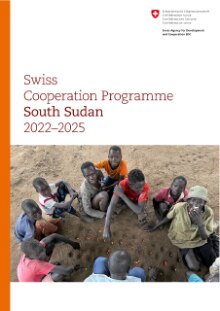- Home
- FDFA
- Publications
- All publications
Search and filter
Publications: 529
-

Swiss cooperation programme South Sudan 2022–2025
-

Programme de coopération suisse au Mali 2022-2025
-

Swiss Peace Supporter 3/2022
In the third issue, various Swiss experts share their knowledge of humanitarian demining. The article on the work of the Right to Information Commission in Sri Lanka in light of its current crisis and the review of the Human Security Adviser's work in Colombia since 2017 are also worth reading.
-

Un seul monde 3/2022
Millions of people have no access to clean drinking water – a report from Tajikistan and Uzbekistan.
-

Swiss Peace Supporter 2/2022
This issue focuses on the Middle East. We bring you coverage of the first Swiss national to be appointed head of the UNTSO peacekeeping mission, and discuss Switzerland's engagement in Syria and Lebanon. You can also read reports on the evacuation from Kyiv and on the CIVPOL mission in Mali, as well as a special article on the importance of justice and law enforcement in peace support.
-

Swiss Development Cooperation and Humanitarian Aid: statistics 2020
This publication consists of six tables providing an overview of public development assistance (Swiss Confederation, cantons, communes) and private grants (NGOs) from Switzerland in 2020, by recipient country and by organization. It also includes a list of the main projects by country.
-

Swiss cooperation programme Albania 2022-2025
Switzerland has been supporting Albania’s political, social and economic transition since 1992, having established diplomatic relations in 1970. Today, Switzerland ranks among Albania’s largest bilateral cooperation partners.
-

Un seul monde 2/2022
Decent work worldwide is considered a key factor for reducing poverty. But there are major challenges – and the pandemic has only added to them.
-

Cooperation programme Bolivia 2022-2024
This Phasing out Programme will continue to focus the work of SDC in Bolivia on three thematic areas which are essential for sustainable improvement in the living conditions of the country’s poorest people: Economic Development, Govern ance, and Climate Change and the Environment.
-

Cooperation programme for Central America 2022-2024
With its new 2022-2024 Cooperation Programme in Central America, Swiss Cooperation is entering a new phase. The Dispatch on Switzerland’s International Cooperation 2021-2024 envisages a responsible and gradual withdrawal of Swiss bilateral cooperation from Latin America and the Caribbean.
-

The SDC's engagement for clean air for all
-

Swiss cooperation programme Kosovo 2022-2025
Starting with humanitarian assistance in 1998, Switzerland’s cooperation with Kosovo has gradually shifted towards supporting transition processes and progress towards European standards and values. In 2008, Switzerland was one of the first countries to recognize the republic of Kosovo and to establish diplomatic and consular relations. Switzerland and Kosovo have since then developed a trusted partnership based on mutual interests and rooted in the spirit of the cooperation agreements between the two governments.
Last update 26.01.2022
